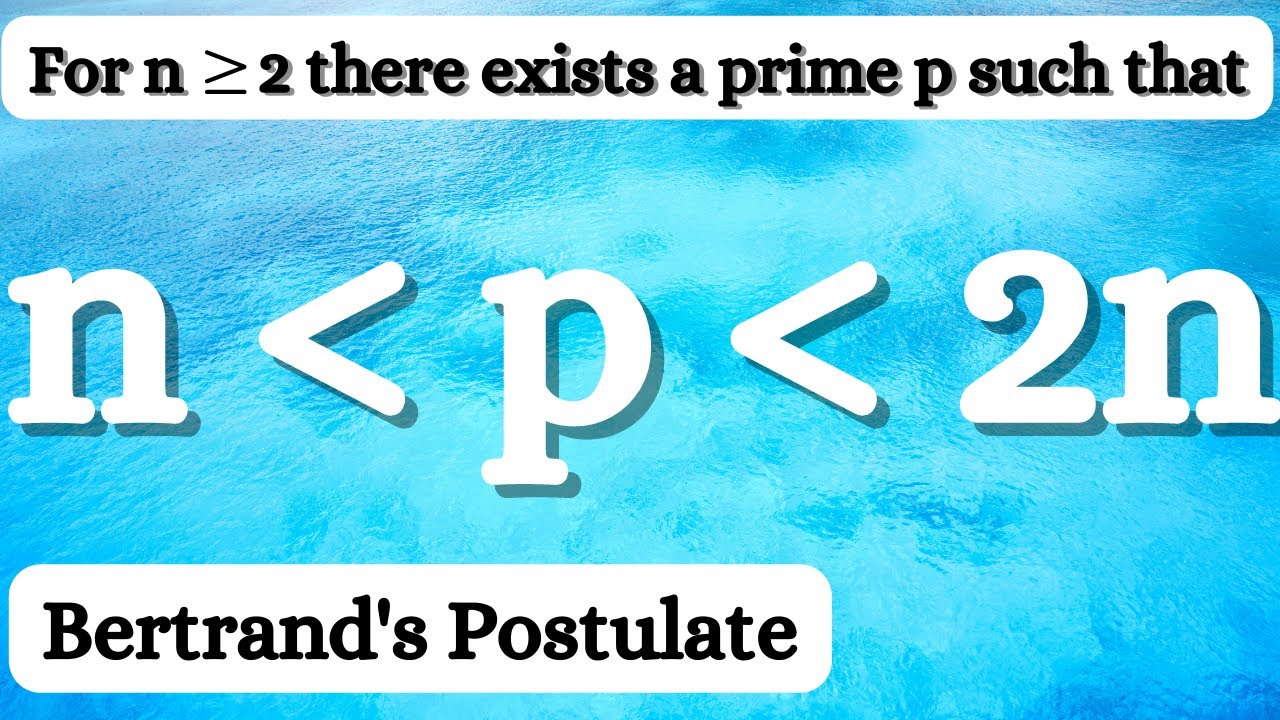
Bertrand's Postulate, named after the French mathematician Joseph Bertrand, is a fascinating concept in number theory that has intrigued mathematicians for centuries. This postulate, also known as Bertrand's conjecture, proposes that for any integer n greater than 3, there always exists at least one prime number between n and 2n-2. This seemingly simple yet profound statement has profound implications in the field of mathematics and has sparked extensive research and discussion.
In this article, we will delve into six essential facts about Bertrand's Postulate, shedding light on its historical significance, mathematical implications, and modern-day relevance. From its origins to its impact on prime number distribution and the Riemann Hypothesis, we will explore the intricacies of this intriguing mathematical conjecture. Join us on this journey as we unravel the mysteries and significance of Bertrand's Postulate, gaining a deeper understanding of its role in the realm of number theory.
Key Takeaways:
- Bertrand’s Postulate, first proposed by Joseph Bertrand in 1845, has fascinated mathematicians for centuries and continues to inspire new discoveries in prime number theory.
- Pafnuty Chebyshev’s proof of Bertrand’s Postulate in 1852 validated its significance, leading to extensive research and exploration in the captivating realm of prime numbers and their intricate properties.
Bertrand's Postulate was first conjectured by Joseph Bertrand in 1845.
This pivotal conjecture proposed that for any integer n greater than 3, there always exists at least one prime number between n and 2n – a statement that has captivated mathematicians and inspired numerous proofs and variations over the years.
The postulate was proven by the legendary mathematician Pafnuty Chebyshev in 1852.
Chebyshev's groundbreaking proof validated Bertrand's conjecture, establishing it as a fundamental theorem in number theory. His elegant demonstration provided a profound insight into the distribution of prime numbers and their relationship to integer intervals.
Bertrand's Postulate has far-reaching implications in various mathematical domains.
From its applications in combinatorics and probability theory to its relevance in understanding the distribution of prime numbers, Bertrand's Postulate continues to influence diverse areas of mathematics, serving as a cornerstone for further exploration and discovery.
The postulate has inspired extensive research and conjectures in prime number theory.
Mathematicians have delved deep into the intricacies of prime numbers, drawing inspiration from Bertrand's Postulate to formulate new conjectures and theorems that contribute to the ongoing evolution of number theory and its profound implications in mathematics.
Bertrand's Postulate plays a crucial role in the study of prime gaps.
The theorem's assertion regarding the existence of prime numbers within specific intervals has sparked intensive investigations into prime gaps, leading to significant advancements in understanding the distribution and patterns of prime numbers across the number line.
Bertrand's Postulate continues to captivate mathematicians and enthusiasts alike with its enduring significance.
As an enduring cornerstone of number theory, Bertrand's Postulate remains a source of fascination and inspiration, driving ongoing research and exploration in the captivating realm of prime numbers and their intricate properties.
Bertrand's Postulate stands as a testament to the enduring allure and profound impact of mathematical conjectures, serving as a timeless beacon of inspiration for mathematicians and enthusiasts alike.
This iconic theorem, first conjectured by Joseph Bertrand in 1845, has left an indelible mark on the landscape of number theory, inspiring generations of mathematicians to unravel its intricacies and explore its profound implications across diverse mathematical domains. With its validation by Pafnuty Chebyshev in 1852, Bertrand's Postulate solidified its position as a fundamental theorem, offering profound insights into the distribution of prime numbers and their intricate relationship to integer intervals. This pivotal conjecture has sparked extensive research, inspiring new conjectures and theorems that continue to shape the evolving landscape of number theory and prime number theory. Bertrand's Postulate's enduring significance is evident in its far-reaching implications across various mathematical domains, from combinatorics and probability theory to the study of prime gaps, where it continues to serve as a catalyst for exploration and discovery. As a timeless beacon of inspiration, Bertrand's Postulate stands as a testament to the enduring allure and profound impact of mathematical conjectures, captivating mathematicians and enthusiasts with its timeless relevance and enduring significance.
Conclusion
In conclusion, Bertrand's Postulate, though simple in its statement, has profound implications in number theory and prime number distribution. The postulate, formulated by Joseph Bertrand in 1845, asserts that for any integer n greater than 3, there always exists at least one prime number between n and 2n. This seemingly straightforward assertion has captivated mathematicians for centuries, leading to numerous investigations and refinements. Understanding the intricacies of Bertrand's Postulate not only sheds light on the distribution of prime numbers but also unveils the elegance and complexity of mathematical reasoning. As we continue to delve into the mysteries of prime numbers, Bertrand's Postulate stands as a timeless cornerstone in the realm of number theory, inspiring further exploration and discovery.
FAQs
What is Bertrand's Postulate?Bertrand's Postulate, proposed by Joseph Bertrand in 1845, states that for any integer n greater than 3, there always exists at least one prime number between n and 2n.
Why is Bertrand's Postulate significant?Bertrand's Postulate holds significance in number theory as it provides insights into the distribution of prime numbers and serves as a fundamental principle for understanding prime number patterns and properties.
Was this page helpful?
Our commitment to delivering trustworthy and engaging content is at the heart of what we do. Each fact on our site is contributed by real users like you, bringing a wealth of diverse insights and information. To ensure the highest standards of accuracy and reliability, our dedicated editors meticulously review each submission. This process guarantees that the facts we share are not only fascinating but also credible. Trust in our commitment to quality and authenticity as you explore and learn with us.
